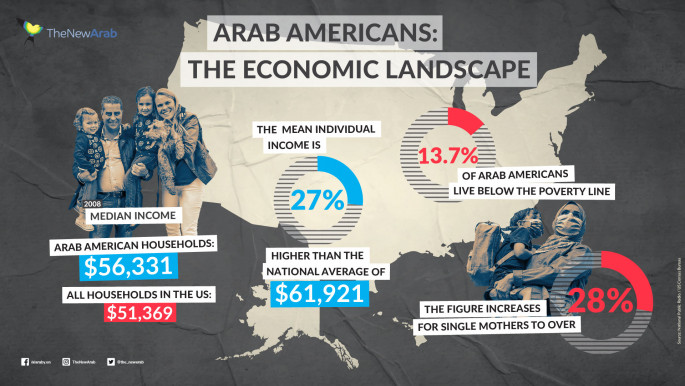
As a Palestinian-American woman, I'm voting for a freer, more democratic world
I have moved through these spaces en route to achieving a better world, one that exhibits freedom, justice, and equality.
Of course, I understand that the electoral process alone will not liberate us, but it is one essential element in this work. It's part of a broader, multifaceted path toward a more equitable world, one which includes everything from movement building, to grassroots organising, advocacy, protests and mobilisations - and, yes, the ballot box.
We vote with the deep understanding that the electoral process was never meant to set BIPOC (Black Indigenous People of Colour) communities free. In fact, voter suppression, from the depths of history to this day and age, is alive and well with attempts to generate intentional disenchantment, disengagement, and fatigue.
 |
Voter suppression, from the depths of history to this day and age, is alive and well |  |
While Black and brown communities are tired of choosing the cleaner dirty shirt, elections are about more than just choosing the president: We have an opportunity and responsibility to participate at all levels - in federal, state and local races. It's important we understand our ballot: who is on there and the values they represent, from those running for the local school board, to those in Congress.
Violent policies and oppressive systems are not new, and we must continue to advocate for the most disenfranchised, especially those not granted the right to vote such as returning citizens and undocumented communities.
The disparities and inequality experienced by BIPOC communities can, and will continue to fester under elected officials and administrations that seek to sustain a white supremacist agenda. And all too often, we experience rabid Islamophobic, anti-Palestinian and racist rhetoric from both sides of the aisle. Theirs are not just problematic policies but a form of violence, evidenced by the increase in hate crimes and hate incidents against communities of colour.
 |
|
| Click to enlarge |
In the state of Florida, we have seen, endured and continue to drown in harmful policies that flood our state capitol at nearly every legislative session. The Florida legislature continues to enact damaging laws that suppress our freedom to boycott and protest, such as SB 86/HB 527 which condemns the BDS movement against the Israeli government.
Their unlawful legislation has also translated into bills such as HB741, which equates the criticism of Israel with anti- Semitism, and criminalises young activists and students on university campuses who are vocal on consistent human rights, inclusive of Palestinian human rights.
And anti-immigrant bills, like SB 168 that forces local police to serve as immigration enforcement, and authorises them to detain immigrants solely for being undocumented, are only a dash of the xenophobic legislation that has passed. While we continue to take to the streets in protest, we have to continuously push back against these discriminatory policies and racist practices, and re-commit to protecting BIPOC communities by building collective power.
As a Muslim Palestinian woman voter, I often find my communities are marginalised on many sides. But I refuse to forfeit my vote and my right to mobilise, and I encourage others to do the same, aware of the role we can play in working towards a more free world for all.
 |
Muslim women have historically been leaders for all people, and we will continue to lead by centering the voices of the most disenfranchised communities |  |
I sit on the board of the Muslim Women's Organisation and am currently the Director of the Muslim Women Vote Early (MWVE) Campaign. Muslim women have always been a dynamic and unapologetic group, made up of women from so many backgrounds and identities. By engaging in our communities through civic processes, we know we have the power to produce impactful and meaningful change for so many communities of colour, victimised by the exploitation of decision makers.
MWVE Campaign has been mobilising Muslim women to lead and engage in their communities through Get Out the Vote efforts, such as virtual town halls addressing issues of anti-Blackness, oppressive systems and climate justice, and voter guides on Florida amendments, or two-day car caravans.
MWVE is also engaging non-voting community members in learning about civic issues relevant to Muslims today, and how we can unify our voices to bring attention to policies impacting us as Muslim women in Florida and in the United States.
Muslim women have historically been leaders for all people, and we will continue to lead by platforming the voices of the most disenfranchised communities - ensuring that we are all heard, and will continue to be heard, through movement building such as civic engagement, advocacy, grassroots organising, and mobilising people power.
Rasha Mubarak is a Palestinian-American Muslim community activist, consultant, and political strategist. In 2019 she was named Florida Young Democrat of the Year.
Follow her on Twitter: @RashaMK
Have questions or comments? Email us at: editorial-english@alaraby.co.uk
Opinions expressed in this article remain those of the author and do not necessarily represent those of The New Arab, its editorial board or staff.





 Follow the Middle East's top stories in English at The New Arab on Google News
Follow the Middle East's top stories in English at The New Arab on Google News


